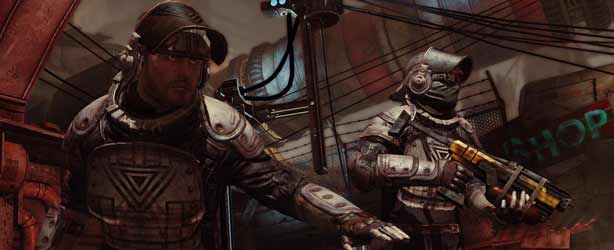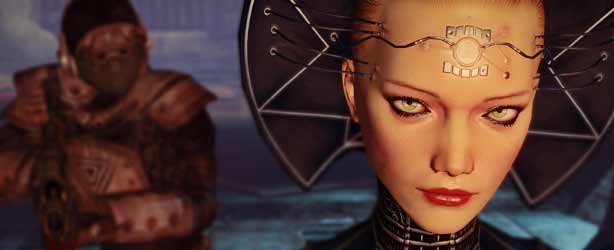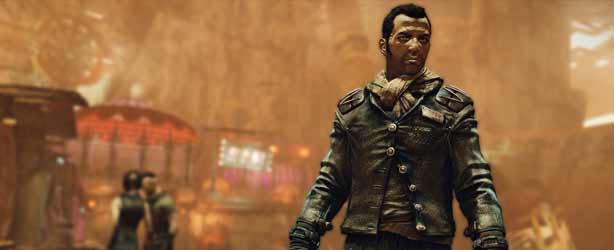
Mars: War Logs Review
Developer: SpidersPublisher: Focus
Platform(s): PC (reviewed), PlayStation 3, Xbox 360
UK Price: £14.99
US Price: $19.99
We recommend Mars: War Logs. That’s a curt appraisal that goes against the score you’ll see on the next page. It’s a strange recommendation, because it’s not one that coincides with a suggestion that the game is particularly good. It’s instead an interesting bookmark for people who’ve a formal interest in game design or criticism. If that’s you, it’s something you should look at, because it’s a great way to understand the difference between a game that gets everything right and one that stumbles spectacularly in so many little areas it entirely fails to justify itself.
Mars: War Logs has a lot of the hallmarks of an excellent game. It’s got a combat system that’s learned from The Witcher’s tactical dodging, parrying and negative status-conferring. It has the kind of exploration and attempts at character work that you’d expect out of Mass Effect, plus a morality system and ways to have a sense of authorship over the way missions end. There’s an interesting crafting system that has you adding components to your existing gear in order to convey different advantages and there’s a plot that can weave and turn with your actions.

None of this emulation, nor the ideas that the game progenerates, succeed and instead appear as if the designers have missed the purpose of their inclusion.
Set in Distant-Future Mars, you play as Roy, a prisoner of war captured by nebulously defined Baddies. The aim of the first act is to escape from your imprisonment and subsequent chapters involve you attempting to overthrow evil by way of helping out strangers with menial tasks that usually involve hitting people with improvised weaponry. The character motivations are rote and the plot itself seems like justification for progression rather than something that works interactivity around it’s own storytelling aims.
Partly why game stories are worth seeing isn’t for their eventual culmination or the events along the way, it’s the character work that propels the player forward. You won’t want to talk to anyone more than you have to, the dialogue is awfully written ([url=www.youtube.com/watch?v=ovAJdz_932w]here’s a link to just one example[/url]) and the voice acting is just as sub par.

Progressing through that story will involve hundreds of minor skirmishes. There are four types of enemy you can fight. Humans and Mars-Indigenous Moles are almost directly comparable, rarer Technomancer enemies wielding a variety of defensive abilities offer slightly more challenge. Finally, you’ll fight “dogs” (actually massive quadrupedal prawns) who can only be attacked from behind. War Logs suggests it contains a variety of options, but the most effective method is constantly rolling away from danger and performing brief melee attacks when it suits you for every single enemy in the game. You’ve the ability to increase the effectiveness of your “technomancer” abilities that can boost weapon damage, provide a shield or shoot projectiles, but it’s just not as effective as pumping skill points into improving the aforementioned rolling tactic as there’s a cap on how much you can use those abilities without recharging.
You’ve partner AIs that join you in combat, but only a character that’s brought into your party in the last act of the game has any effectiveness as a fighter rather than a tool with which to draw some of the enemies away from you and eventually faint. There’s no way to outfit these partner characters with better equipment nor specialise their skills in any way. It leaves you feeling as if there’s barely a reason for their assistance.

Often during a mission you’ll have to take back something that’s stolen or collect money backtracking constantly through the same areas. You’ll usually be given a choice between intimidating the target or hopping into a fight. Intimidation might not work and could transition into combat anyway. This kind of system works elsewhere because you’d have the option to put stat points into your abilities to talk people into agreeing with you. Here the only character upgrades you can make are directly tied to your effectiveness in battle. You don’t get the sense that you’re making decisions based on the route you’ve chosen for your character, instead it’s just selecting an option that may spare you a fight or not work and is essentially the same choice presented differently.

MSI MPG Velox 100R Chassis Review
October 14 2021 | 15:04









Want to comment? Please log in.